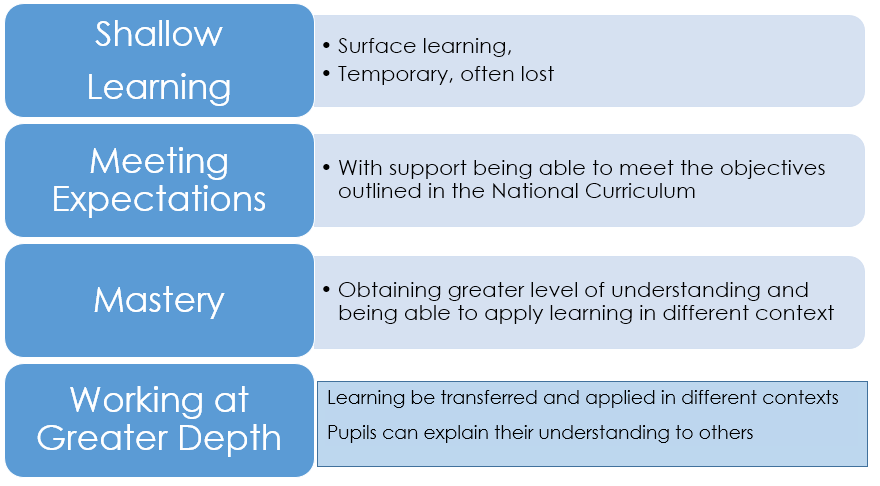Maths
St Oswald’s Maths Curriculum
Intent
"We believe that every child can master an understanding and love of maths with the right kind of teaching and support."
Our aim is to ensure that all children develop fluency in mathematics, enabling them to reach a depth of knowledge to reason mathematically and solve problems. Children’s journey will be achieved through exploration, clarification, practice and application over time. At each stage of learning, children will be able to demonstrate a deep, conceptual understanding of the topic and be able to build on this over time.
| |
|
|
Types of learning:
A mastery approach to teaching mathematics intends to develop:
An understanding of the important concepts and an ability to make connections within mathematics
A broad range of skills in using and applying mathematics.
Fluent knowledge and recall of number facts and the number system.
The ability to show initiative in solving problems in a wide range of contexts, including the new or unusual.
The ability to think independently and to persevere when faced with challenges, showing a confidence of success.
The ability to embrace the value of learning from mistakes and false starts.
The ability to reason, generalise and make sense of solutions.
Fluency in performing written and mental calculations and mathematical techniques.
A wide range of mathematical vocabulary.
A commitment to and passion for the subject.
Mathematics Teaching and Learning Policy
All sequences of learning will be based on using the key principles behind the Singapore Mastery approach. When children reach mastery, they will be able to apply new learning to a new context. Children that are working at a greater depth will be able to transfer their new learning to a variety of contexts, reason their ideas and actions by drawing on previously taught concepts.
Concepts and skills will be taught and practiced using concrete, visual and abstract methods (CVA). Pupils are first taught an idea or skill by acting it out with real objects and are then moved into a visual stage using pictorial representations. The final abstract stage is a chance for pupils to represent problems by mathematical notation. It is expected that the CVA approach is used continuously in all new learning and calculations throughout the school.
Sequences of learning using the ‘Maths No Problem!’ textbooks and workbooks are designed to give pupils a consistent and smooth progression of learning in calculation strategies across the school. Our calculation policy shows methods that children will be taught within their respective year group.
Maths No Problem(MNP)! Sequences of learning will be considered carefully to ensure they meet the specific needs of the class. Appropriate complimentary materials will also be used in addition to the MNP sequences of learning in order to ensure all children are challenged appropriately and will reach the next steps. Materials such as Classroom Secrets, White Rose Maths, NCMT, GLOW and teacher’s own mini-steps will be manipulated.
Children should be confident in choosing and using strategies that they know will get them the answer as efficiently as possible. Pupils will be given opportunities to reason these decisions through marking.
Opportunities to reach mastery through discussion and paired work will be incorporated into lessons. When-ever possible opportunities to share greater depth challenges will also be discussed to ensure all children strengthen their mental agility and are exposed to a wide-range of strategies.
Children are expected to explain and reason both verbally and in written format using their Learning Journals. It is expected that throughout the school, children answer in full sentences and use appropriate mathematical vocabulary. Children will be taught ways to do this using effective modelling, STEM sentence prompts and with consistent expectations in all areas of learning.
Journals will be used to record and consolidate children learning. Through journaling, children will record their written calculations, represent work that has been done practically, explain written calculations, work out calculations that are too difficult to do mentally and reflect on their current learning. Through dated and clear lesson headings, these journals will help assess a child’s current level of understanding.
Where-ever possible, marking in journals will encourage deep-level thinking skills. Sequences of learning will ensure adequate reflection time is given to complete these challenges.
